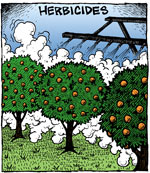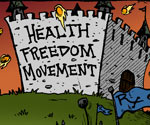Serotonin and Dopamine - The Surprising Nutritional Connection Between the Two Best-Known Neurotransmitters
| Share on Facebook | Share on Twitter | Share on Google+ |
Serotonin and dopamine are well-known regulators of mood and behavior. The brain uses serotonin to transmit "satisfaction" signals associated with happiness and a sense of well-being. The brain uses dopamine to transmit "movement" signals, associated with pleasurable activities and the desire to do more.
Foods with a high serotonin content. The two foods with the highest serotonin content are butternuts and black (not English) walnuts, both containing over 300 micrograms of serotonin in each gram of the food. These nuts are not commercially available, because it is literally necessary to smash each individual nut open with a hammer to obtain the edible nut inside. Several other foods, however, contain serotonin in concentrations high enough that a 3-1/2 oz (100 g) serving will affect mood. In order of descending serotonin content, these foods are:
- English walnuts (87 micrograms/gram)
- Plantains (30 micrograms/gram)
- Pecans (29 micrograms/gram)
- Pineapple (18 micrograms/gram)
- Bananas (15 micrograms/gram)
- Kiwi fruit (5 micrograms/gram)
- Plums (4 micrograms/grams)
- Tomatoes (2 micrograms/gram)
California (Haas and Fuerte) avocados but not Florida (alligator or Booth) avocados are also relatively high in serotonin content. Eating these foods will change mood, and also change blood and urine tests for serotonin levels.(Read more about serotonin levels).
Foods with a high dopamine content. The plant food with the highest dopamine content is the cow-itch bean, also known by its botanical name, Mucuna pruriens. The American natural products maker Organix South uses some varieties of this bean that are up to 4% dopamine by weight. These beans provide a literally medicinal dose of dopamine, enough to treat Parkinson's disease. Other foods that are high in dopamine, but with variable concentrations, include:
- Fava beans
- Natto (a kind of fermented soy made with whole beans)
- Lima beans
Why serotonin and dopamine in food is beneficial. Serotonin and dopamine in the foods we eat can be beneficial to us, but they are also beneficial to the plants.
 It's mostly fruits and nuts that have high serotonin content. These are plants that bear dozens, hundreds, or even thousands of seeds (inside the fruit) or nuts to reproduce themselves. If the nut has a high serotonin content, the animals, and humans, that eat them will be satisfied with fewer fruits or fewer nuts.
It's mostly fruits and nuts that have high serotonin content. These are plants that bear dozens, hundreds, or even thousands of seeds (inside the fruit) or nuts to reproduce themselves. If the nut has a high serotonin content, the animals, and humans, that eat them will be satisfied with fewer fruits or fewer nuts.
Beans tend to be low-lying plants. They are especially vulnerable to being eaten by cattle, sheep, and goats. The brain stimulant chemical dopamine impels grazing animals, and grazing humans, to move on, possibly leaving at least one bean to start the next generation.
The amounts of dopamine and serotonin in foods are not likely to cause overdoses except in the cases of eating too many butternuts, black walnuts, cow-itch beans (which should only be used as an herb), and fava beans. People of Turkish, Italian, African, or Arab descent sometimes have a hereditary sensitivity to fava beans that causes breakdown of red blood cells (and that also confers resistance to malaria, since the malaria parasite is not able to enter red blood cells to reproduce itself). If you have Middle Eastern, Mediterranean, or African descent, eat fava beans with caution, and not more than once serving a week.
Selected References:
Feldman JM, Lee EM. Serotonin content of foods: effect on urinary excretion of 5-hydroxyindoleacetic acid. Am J Clin Nutr. 1985 Oct;42(4):639-43.
-
Skin CareMen Skin Care
-
Free ResourcesFree eBooks
-
The physician should not treat the disease but the patient who is suffering from it.Maimonides
-
Featured Health Supplement"...I also suffer from mild-to-moderate depression, so several months ago as an experiment I ordered a few bottles of the Neuro-Natural Serenity formula, but never took it consistently. However, I started taking it faithfully last week at full dose and already my spirits are lifting and I have a greater clarity of mind."
Cathi, USA -



















